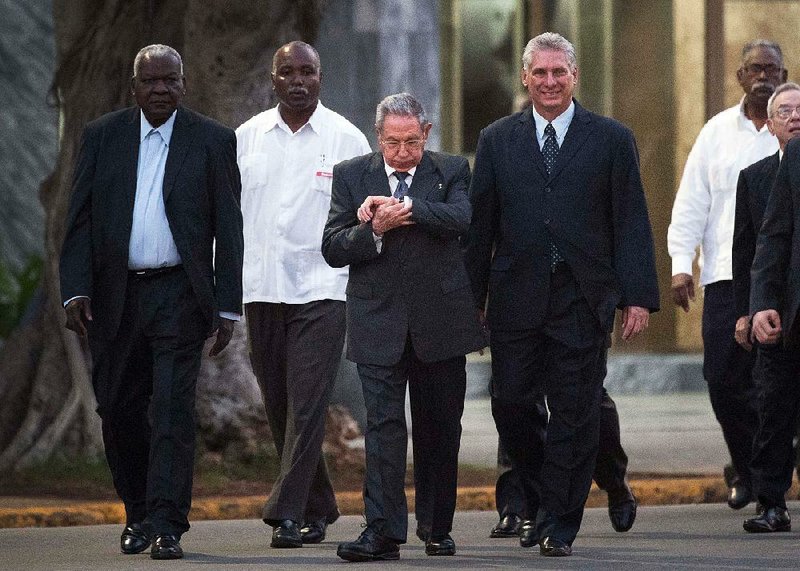SANTA CLARA, Cuba -- Raul Castro travels in motorcades and with rings of bodyguards protecting him. The 86-year-old president of Cuba arrives at official events moments before they begin, and the audience rises to applaud.
A different style was on display March 11 outside a voting station in Santa Clara for Miguel Mario Diaz-Canel Bermudez, the Communist Party official widely expected to take Castro's place as Cuba's next president this week.
Shaking hands and hugging voters, Diaz-Canel arrived, walking with his wife and few bodyguards.
"We're building a relationship between the government and the people here," he said. "The lives of those who will be elected have to be focused on relating to the people, listening to the people, investigating their problems and encouraging debate."
Then Diaz-Canel left for Havana, after an event scripted to send a single message: A new type of Cuban president is coming.
Castro has pledged to step down Thursday and hand the presidency to a successor who most Cubans believe will be the man Castro named in 2013 as his first vice president.
Diaz-Canel, who turns 58 on Friday, would be the first non-Castro to hold Cuba's top government office since the 1959 revolution led by Fidel Castro. The new president will confront a stagnant economy, decaying infrastructure, a hostile U.S. administration and widespread disenchantment with a centrally planned system that can't provide state employees with living wages but forbids most forms of private enterprise.
Raul Castro will remain first secretary of the Communist Party, a potentially more powerful position.
Until March, Diaz-Canel had been seen at greatest length in a leaked video of a Communist Party meeting where he pledged to shutter some independent media.
That image has begun to change slightly this year as Diaz-Canel stepped into the moderate limelight offered by Cuba's Soviet-style state media.
Raised and educated in the city of Santa Clara, Diaz-Canel graduated from the local university in 1982 and performed three years of obligatory military service. In 1987 he joined the Young Communists' Union. He went on to work as a professor of engineering at the University of Santa Clara and traveled to Nicaragua as part of a government-run mission to support that country's socialist revolution.
Santa Clara residents remember him openly admiring the Beatles, who were considered as representative of the decadent culture of Cuba's capitalist enemies.
Nonetheless, the young professor was named first party secretary in Villa Clara province in 1994 and gained a reputation as a hardworking public servant with a conspicuously modest lifestyle. Residents said this month that Diaz-Canel was the first official they remembered who didn't move to a new government-provided home after accepting the position of first secretary.
Diaz-Canel traveled the city on a bicycle during the economic crisis spawned when the fall of the Soviet Union cut off subsidies for Cuba, and he accepted visits at all hours at his home and office from residents with complaints or suggestions. When he finished work, residents said, he would start his shifts with the local Committee for the Defense of the Revolution, a mix of a neighborhood watch committee and local militia.
Diaz-Canel also became known for pushing back against the intolerant tendencies of the Communist Party.
As first secretary of Villa Clara, he was an active supporter of El Mejunje, a cultural center that hosted rock 'n' roll shows and became a focus of activities by lesbian, gay, bisexual and transgender Cubans, including some of the country's first drag shows.
In 2003, Diaz-Canel was named first secretary of the eastern province of Holguin, where he ran into complaints.
Some said he focused too much of his six years in office on beautifying the city center while neglecting the needs of poor and working people.
In 2003, Diaz-Canel was named to the Communist Party's Politburo, one of its highest-ranking bodies. Six years later, he was named minister of higher education and was praised for modernizing curricula and introducing computer technology to many university programs.
A Section on 04/18/2018

